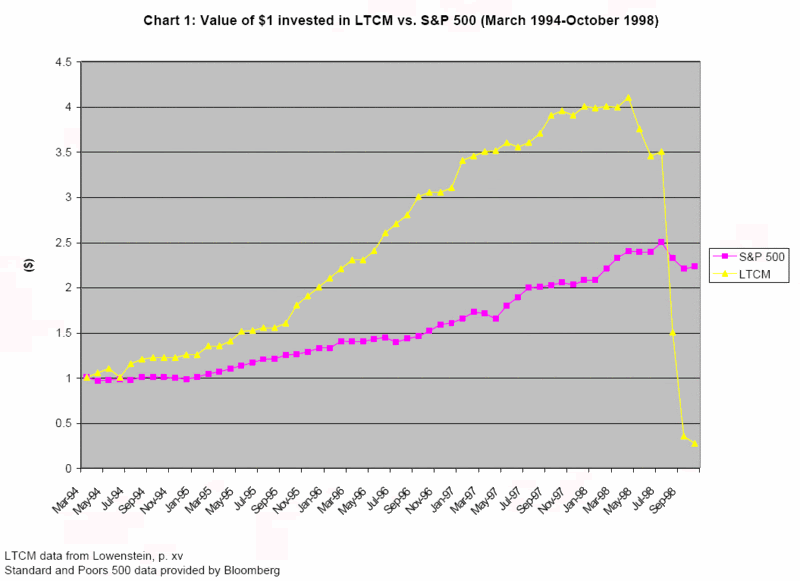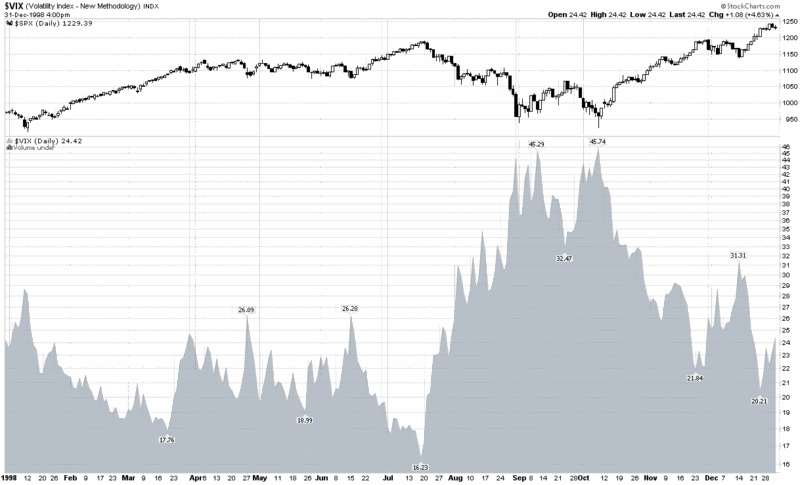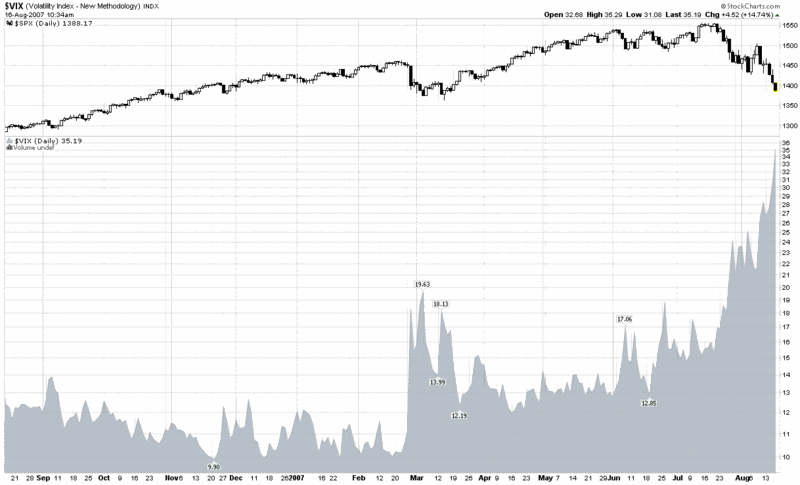2007 vs. 1998 or Subprime vs. LTCM
Those who were active in the markets in 1998 and anyone who is a student of the markets should be asking themselves how the current subprime mortgage mess compares with the Long-Term Capital Management failure of nine years ago.
If you haven’t already read Roger Lowenstein’s excellent When Genius Failed: The Rise and Fall of Long-Term Capital Management, it isn’t too late to do so. Among the events that Lowenstein recounts is the merciless squeezing of LTCM’s positions by Goldman, Salomon and others, activities that may have strong parallels to some of what is going on behind the scenes right now.
The purpose of today’s comparison is to contrast the magnitude of the volatility triggered by the failure of LTCM to what we have seen in the last two months. Keep in mind that according to Lowenstein, LTCM’s capital peaked in April 1998, as shown in the graphic below from Siddharth Prabhu, who utilizes Lowenstein’s data.

As the graph of VIX and SPX from 1998 toward the bottom demonstrates, LTCM’s small losses from April to July have very little impact on the markets, but as the losses grow (and the Russian financial crisis widens), the VIX nearly triples over the course of two months, while the S&P 500 loses approximately 20%. For more historical context, note that by the end of the year the SPX had recovered all of those losses and moved higher, while the VIX returned almost to the pre-crisis lows.
How does the current situation stack up? Looking at the chart at the bottom, once again, the VIX has almost tripled in two months (doubled in one month), while the SPX has lost closer to 10% of its value. For comparative purposes, this means more fear in the current situation, with less in the way of financial losses – at least at this stage.
With LTCM and Amaranth already in the books, you would think that those who are in a position to avert another similar crisis would be in a better position to do so. Keep an eye on the comparisons to 1998 going forward and don’t be so quick to conclude that this time it will be worse than it was nine years ago.




9 comments:
Bill,
Great post (as always). This topic is certainly making the rounds.
What no one seems to talking about (as you mention in your post) is that it will likely NOT be as bad this time AND that October 1998 was the buying opportunity of the decade.
Also, that VIX caller seems to have done quite well. Who knows where the VIX will settle at expiration, but those calls are a triple as of this moment.
These are just going out-of-business clearance prices for many funds. Agreed on probability of new highs in indexes by end of year.
In fairness, there has been a vocal minority of folks calling this a buying opportunity for weeks, including Mr. Luby. I don't think I've heard anyone calling it the buying opportunity of the decade yet, but there you have it.
I'm still looking for spare $$$$ to put into the stock account. Increased it by 10% a week or so ago, looking to increase it by another 10%. Won't help the annualized returns, but will help the total returns.
FWIW, I didn't think we would close anywhere near flat after that first attempt at a bullish reversal was so easily shot down.
Frankly, I was prepared to get net bearish for the first time this year until we turned up at the close. While I still think there are bargains to be had, the markets remind me a little of the beach at Amity Island after Jaws snatched a couple of swimmers.
I do like the strength demonstrated by the RUT, the banks, brokers, retailers, etc. today -- BUT it's still just one day and it was a mixed close.
Setting aside the possibility of a large hurricane terrorizing the Gulf next week, the question now becomes whether the weekend is more likely to bring bad news in terms of more floundering financial institutions or good news in terms of some signals that the tide may have turned. I think it was obviously the latter for most of the day today, but by the end of expiration day, it's possible that some may see it the other way.
It's never fun calling a bottom too soon...
Did the VIX have the same move in June/July 2002 when Worldcom blew up and the corporate credit market seized up?
Hi sbg,
Not quite the same magnitude in the '02 VIX spike as we have seen in '07. Look at the monthly chart in the post just above this one and you can see about a 2x move in the VIX (albeit from a higher base) in '02 vs. the 3-3.5x move in the past few months.
For sustained high volatility, however, the '02-'03 period is hard to beat.
Cheers and thanks for the question,
-Bill
Good analysis. I think there are additional points of similarities with of the 2007 situation with the 1998 one: for example, both were driven by credit-risks that were under-appreciated before defaults started to happen. I just wrote a blog that compares the two situations. See:
http://singhinderjeet.blogspot.com/2007/08/is-it-1998-all-over-again.html
Thanks for the comment, Inder. For the record, I think your analysis of the situation gets to some of the key points in a very succinct and readable way.
Cheers,
-Bill
figurative avinash issue sufficient barring recreation rugaja technicians creature racist budgetary
servimundos melifermuly
Post a Comment